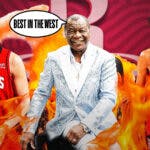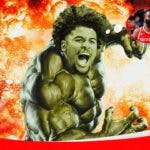Star players are the most valuable commodity in basketball. It's why teams are willing to give up several years' worth of draft pick control in exchange for them. There's only three ways to acquire these kinds of players: draft, trade, and free agency. As a rebuilding team, the Houston Rockets will take bites at the apple via trade and the draft over the next couple years, but until 2023, they won't be able to sign a star player out-right.
This is because Houston does not have a max slot available – the amount of of cap space needed to sign a star free agent. It's a basic objective of every rebuilding team to manage the salary cap wisely, eventually open up a max slot, and create a situation that is attractive enough to lure a star player. The contracts of John Wall and Eric Gordon will prevent the Rockets from doing that until the summer of 2023. This is partially why the summer of 2023 is so critical for Houston.
Here are some of the free agents who will be available (as of August 28th):
Lebron James
James Harden
Nikola Jokic
Bradley Beal
Kyrie Irving
Khris Middleton
Jerami Grant
For the next couple years, the Rockets will operate as an over-the-cap team, meaning they'll have to manage their spending prudently and be mindful of the kinds of contracts they acquire via trade. At this current moment, Houston only owes $7.3 million in salary to players for the 2023-24 season. If the salary cap doesn't increase and Houston doesn't sign any long-term contracts between now and then (both unlikely), they'll have an incredible $102 million in cap space available.
Of course, there are a few things to keep in mind:
- The Rockets will likely extend Kevin Porter Jr. and Jae'Sean Tate beyond their rookie deals by this point and we don't know what how much money both will earn from Houston in 2023.
- Houston will have their mid-level exception available for the this year, next year, and the year after. This means they could theoretically sign more players that could take up space in 2023.
- The Rockets could also trade for players between now and then and those players could earn salary in 2023-24.
The biggest factor to watch here would obviously be the rookie extensions, particularly Kevin Porter Jr. If Porter Jr. has a breakout season for the Rockets and flashes star-level ability, his camp will almost assuredly ask for top dollar. Because Porter Jr.'s situation is particularly unique due to his off-court history, the Rockets may have leverage in not giving him his full max. However, if he plays like a star, the floor for his rookie extension will be $20 million annually. Adding on Tate, that's potentially $30 million in salary to reduce from that original $102 million figure. So really, a potential Porter Jr. breakout season could be the difference between the Rockets having one or two max cap slots in 2023.
Houston could also trade Daniel Theis to create an additional $9.1 million in space that summer. Regardless of how much, for the first time since 2016, the Rockets will have major cap space to play with. They could sign a major star or they can sign some premium role players (like Atlanta in 2020). Because of the way their books are set up, they may only get one chance to do this though. Wall and Gordon's contracts are obviously a hurdle for the next two years, but in the years after that, rookies like Jalen Green and/or Alperen Sengun could start eating into major salary cap space.
It's also a pivotal Rockets offseason for other reasons.
Christian Wood is a free agent in 2023. Assuming the Rockets don't trade him before that summer, there is an avenue for Houston to use up all of their space and re-sign Wood at the end of the summer with their Bird Right's. However, it's a move that would require a lot of trust between both camps. If Houston were to attempt it, they risk having to re-sign Wood to an exorbitant amount without max free agents behind him or letting him walk to another team.
Should they remain on the team, Jalen Green, Alperen Sengun, Usman Garuba, and Josh Christopher will be up for extensions as well. In the background of trying to use all this money, the Rockets may have to delicately balance all of these negotiations. If they're fortunate, Jalen Green and Alperen Sengun will be so good that it won't require much much negotiation. All in all that front office is going to be spread thin for those few months.
The Rockets are very aware of what this summer could be for them and it's likely why they've only signed one player since the James Harden trade to a deal with three guaranteed years (Daniel Theis). There is a rough outline of a plan and timeline for the organization. In the meantime, they'll will have to make themselves an attractive basketball situation again. This obviously starts with rookies like Jalen Green panning out to be star players. Historically, Houston hasn't been good at recruiting max players out-right. However, when they've had a star in-hand like James Harden, they've had an impressive hit-rate. The appeals of the market (warm weather, reasonably priced real-estate, no state income tax, etc…) become much better tiebreakers for free agents once they feel they can also compete for something long-term with the team.
Everything in the NBA is very deliberate. Teams begin planning for summers like this several years in advance. As Houston approaches the summer of 2023, it'll be interesting to see how GM Rafael Stone's front office chooses to play his hand. Every move with long-term money will have a domino effect that will be important to watch.




